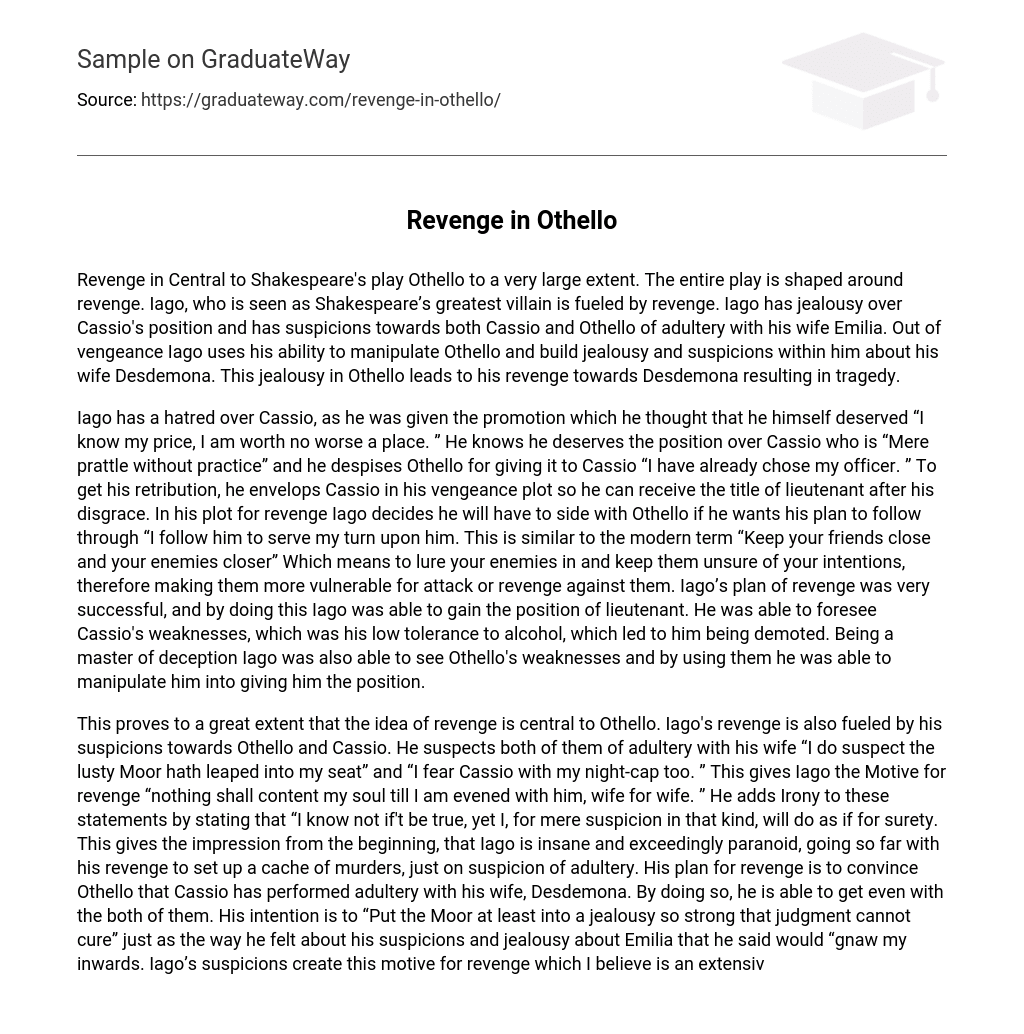Revenge in Central to Shakespeare’s play Othello to a very large extent. The entire play is shaped around revenge. Iago, who is seen as Shakespeare’s greatest villain is fueled by revenge. Iago has jealousy over Cassio’s position and has suspicions towards both Cassio and Othello of adultery with his wife Emilia. Out of vengeance Iago uses his ability to manipulate Othello and build jealousy and suspicions within him about his wife Desdemona. This jealousy in Othello leads to his revenge towards Desdemona resulting in tragedy.
Iago has a hatred over Cassio, as he was given the promotion which he thought that he himself deserved “I know my price, I am worth no worse a place. ” He knows he deserves the position over Cassio who is “Mere prattle without practice” and he despises Othello for giving it to Cassio “I have already chose my officer. ” To get his retribution, he envelops Cassio in his vengeance plot so he can receive the title of lieutenant after his disgrace. In his plot for revenge Iago decides he will have to side with Othello if he wants his plan to follow through “I follow him to serve my turn upon him. This is similar to the modern term “Keep your friends close and your enemies closer” Which means to lure your enemies in and keep them unsure of your intentions, therefore making them more vulnerable for attack or revenge against them. Iago’s plan of revenge was very successful, and by doing this Iago was able to gain the position of lieutenant. He was able to foresee Cassio’s weaknesses, which was his low tolerance to alcohol, which led to him being demoted. Being a master of deception Iago was also able to see Othello’s weaknesses and by using them he was able to manipulate him into giving him the position.
This proves to a great extent that the idea of revenge is central to Othello. Iago’s revenge is also fueled by his suspicions towards Othello and Cassio. He suspects both of them of adultery with his wife “I do suspect the lusty Moor hath leaped into my seat” and “I fear Cassio with my night-cap too. ” This gives Iago the Motive for revenge “nothing shall content my soul till I am evened with him, wife for wife. ” He adds Irony to these statements by stating that “I know not if’t be true, yet I, for mere suspicion in that kind, will do as if for surety. This gives the impression from the beginning, that Iago is insane and exceedingly paranoid, going so far with his revenge to set up a cache of murders, just on suspicion of adultery. His plan for revenge is to convince Othello that Cassio has performed adultery with his wife, Desdemona. By doing so, he is able to get even with the both of them. His intention is to “Put the Moor at least into a jealousy so strong that judgment cannot cure” just as the way he felt about his suspicions and jealousy about Emilia that he said would “gnaw my inwards. Iago’s suspicions create this motive for revenge which I believe is an extensive part of the play. Iago’s anger entraps Othello in a web of deceit. Iago, the master manipulator conjures up suspicions in Othello about Cassio and Desdemona. Jealousy becomes Othello’s down fall which Iago uses as a tool to work with “ O, beware, my lord, of jealousy; it is the green-eyed monster which doth mock the meat it feeds on. ” Iago recognizes that this is his weakness. Othello allows this jealousy to eat away at him which feeds his revenge and anger towards Desdemona.
This gives Othello the motive to kill innocent Desdemona “Yet she must die, else she’ll betray more men” Othello’s mind is set on killing his wife after, what he believes, having an affair with Cassio. Although it pains him to kill her his decision will save other men from heartbreak also. It is evident the extent to which Iago has conjured up these suspicions which led to Othello’s hate and revenge. “Ay let her rot and perish and be damned tonight, for she shall not live” Here Othello reveals his plans to kill Desdemona tonight for her betrayal.
His strong desire to reek revenge is clearly conveyed in his word choice; “rot”, “perish”, and “damned” convey connotations of a violent and painful death and the idea that she will be punished by going to Hell, reinforcing the idea she is a “devil” for her infidelity. Revenge shapes the play Othello, its plot and characters. Jealousy is also a big part as it fuels the vengeance in characters and creates tension and conflict. We see how revenge creates tragedy and destroys relationships. Iago is able to operate successfully in his plans, as Desdemona dies, Iago has gained his revenge from Othello.





